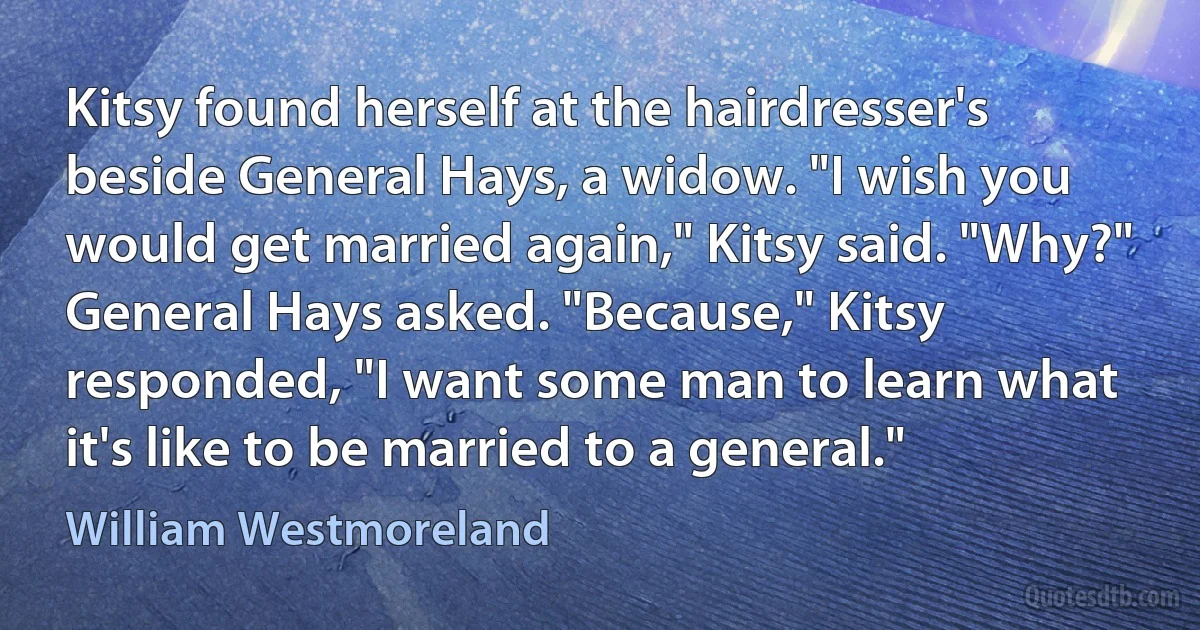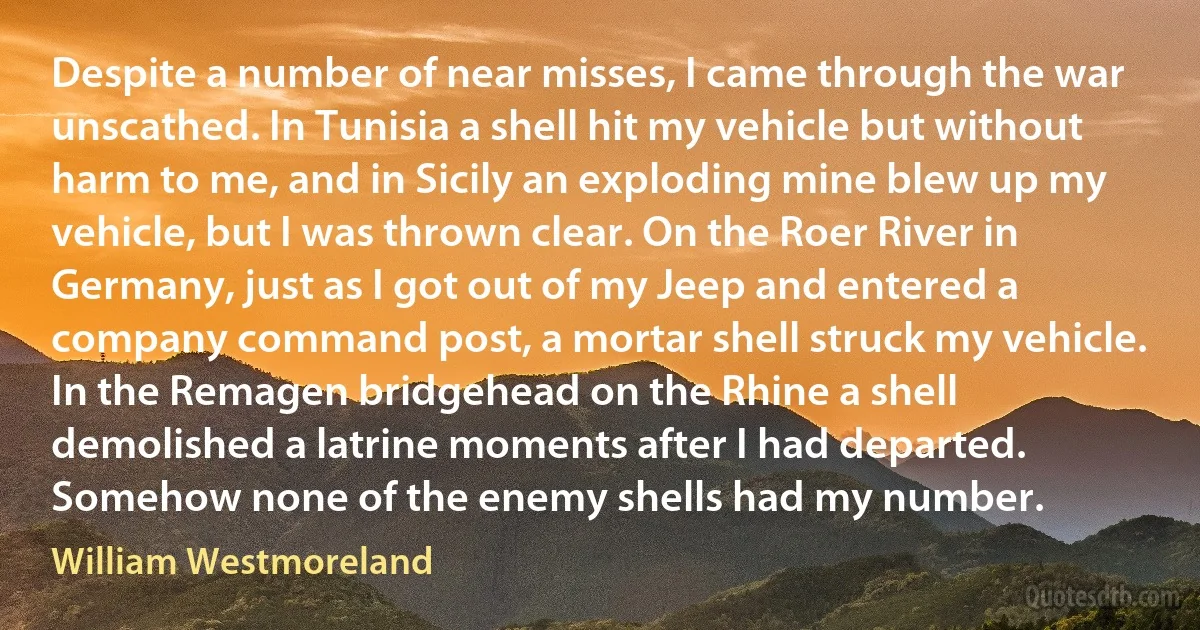William Westmoreland quotes - page 2
Among a stream of visitors to the 9th Division in England, while it was preparing for D-Day in the early months of 1944, was Prime Minister Winston Churchill. When he arrived to address the assembled troops, he went at first not to the speaker's stand but behind a small outbuilding. He reappeared minutes later buttoning his fly, making sure no one missed the reason for the delay. The troops loved it.

William Westmoreland
Being in Germany in the 1940s brought back recollections of my first visit long before as a Boy Scout, when I had had my first encounter with German appreciation of dueling. As as child I had been cut severely on the left cheek when thrown through the windshield of my father's car in a head-on collision, and a prominent scar remained. Traveling in Germany as a youth, I was perplexed when college students would tip their beanie hats as they passed until at last I discerned that they mistook the scar on my cheek for a dueling scar.

William Westmoreland
Forced in January 1973 by American pressure to to accept a cease-fire agreement that left well over 100,000 North Vietnamese troops inside South Vietnam and free access for tens of thousands more, South Vietnamese leaders surely had reason to believe that if their enemy seriously violated the agreement, the United States would interfere. Yet that was not to be. In the face of that grave psychological blow for the South Vietnamese, it required no military genius to assure South Vietnam's eventual military defeat.

William Westmoreland
Patton looked like his father and had similar mannerisms. Their speech was somewhat alike as well. It was pretty evident that young Patton was the son of the old man. However, the impressive thing about George is that he didn't concern himself with his last name. He went out and made a career, earning everything on his own... He did a very good job in command of the 11th ACR and handled himself professionally. It's quite a burden the son of a senior officer has to carry and I must say, to his credit, he did it well. Because down through history, when you look at the sons of famous people, they were not all winners.

William Westmoreland
The enemy had achieved in South Vietnam neither military nor psychological victory. For the South Vietnamese the Tet offensive served as a unifying catalyst, a Pearl Harbor. Had it been the same for the American people, had President Johnson discerned the same support behind him that Thieu did behind him, and had he acted with forcefulness, the enemy could have been induced to engage in serious and meaningful negotiations. Unfortunately, the enemy scored in the United States the psychological victory that eluded him in Vietnam, so influencing President Johnson and his civilian advisors that they ignored the maxim that when the enemy is hurting, you don't diminish the pressure, you increase it.

William Westmoreland
Among some of my military colleagues I nevertheless sense a lingering concern that the military served as the scapegoat of the war in Vietnam. I fail to share that concern. The military quite clearly did the job that the nation expected of it, and I am convinced that history will reflect more favorably upon the performance of the military than upon that of the politicians and policy makers. The American people can be proud that their military leaders scrupulously adhered to a basic tenet of our constitution prescribing civilian control of the military. As the soldier prays for peace he must be prepared to cope with the hardships of war and to bear its scars.

William Westmoreland
As graduation neared, neither my classmates nor I could know, of course, that World War II was in the offing. It was destined to expose us to trying and often tragic events. My roommate, Billy Hulse, a flier, disappeared on a training mission over the Great Lakes, his body never recovered. A close friend, Frank Oliver, died in the fighting in Normandy soon after the invasion. Buist Dowling killed in Normandy while leading a patrol. One of the better football players, Jock Clifford, killed as a regimental commander on Okinawa. Bill Priestly, aide to the high commissioner of the Philippines, electing to stay when the fighting started on the islands, also killed. Those and more.

William Westmoreland
During the war years, it was my privilege to associate on a number of occasions with prominent personalities, such as Senator Harry S Truman, for whom my battalion staged an artillery demonstration when he visited Fort Bragg in 1941. When I invited him to fire, he did so with confidence. Shaking my hand as he departed, he said that as an old artilleryman he recognized that the fire mission was uncomplicated and that, even so, he suspected the crews had helped him hit the target. "I enjoyed it anyway," he said. When I was in Vietnam, a then former President Truman wrote me a letter of encouragement.

William Westmoreland
Ignoring the restrictions which the United States imposed upon itself in conducting the war in Indochina, some observers have seen in the outcome some special military genius on the side of North Vietnam. They have in large measure attributed that alleged genius to my apparent counterpart, Vo Nyugen Giap. In reality, Giap was hardly my counterpart, for my position was never so exalted as Giap's. While he was apparently an influential member of his country's government, I was a field commander restricted to decisions and actions within the boundaries of South Vietnam, subject to the dictates of my country's government, and influential in policy matters only to the extent that Washington chose to act on my recommendations. Yet since Giap was for long his own field commander, there was enough direct confrontation between the two of us to enable me to some degree to analyze and judge his military performance.

William Westmoreland
How could anyone genuinely believe that the South Vietnamese people had no desire to forestall the march of totalitarianism, to maintain their freedom- however imperfect- when for years upon years they bore incredible hardships and their soldiers fought with courage and determination to do just that?

William Westmoreland
Yet Giap persisted nevertheless in a big-unit war in which his losses were appalling, as evidenced by his admission to the Italian journalist Oriana Fallaci that he had by early 1969 lost half a million men killed. Ruthless disregard for losses is seldom seen as military genius. A Western commander absorbing losses on the scale of Giap's would have hardly lasted in command more than a few weeks.

William Westmoreland
I first met George S. Patton, Jr., before World War II when he was a lieutenant colonel at Fort Sill, and in North Africa, when he was a general, I saw him often. Almost every day he would head for the front, standing erect in his jeep, helmet and brass shining, a pistol on each hip, a siren blaring. For the return trip, either a light plane would pick him up or he would sit huddled, unrecognizable, in the jeep in his raincoat. His image with the troops was foremost with General Patton, and that meant always going forward, never backward.

William Westmoreland
Serving one's country as a military man is rewarding experience. It is nevertheless a life of constraint. A military man serves within carefully prescribed limits, be it as enlisted man, junior officer, battalion commander, division commander, even senior field commander in time of war. The freedom to speak out in the manner of the private citizen, journalist, politician, legislator has no part in the assignment. Perhaps this is one reason why generals who have hung up their uniforms traditionally turn to the pen, seek an opportunity for free expression that they have long denied themselves, to report to the people they have served.

William Westmoreland
At the 9th Division headquarters at El Guettar, Tunisia, enemy planes bombed and strafed incessantly, so that the security normally associated with a headquarters in the rear was missing. Although officers and men alike dug deep, even in foxholes they could get little sleep. One day a small convoy of vehicles arrived, sirens alive, Patton standing in the lead vehicle. While the division commander, Major General Manton Eddy, rushed to greet him, the staff pondered what fault Patton would find this time. "Manton, Goddamn it," Patton shouted in his high-pitched voice, "I want you to get these staff officers out front and get them shot at!" Having been bombarded day and night by enemy planes, having had no sleep for days, a young personnel officer went berserk and had to be evacuated for medical treatment.

William Westmoreland
The Chairman of the Joint Chiefs has a difficult job living with his civilian bosses, the Secretary of Defense and the President, striving to convince them in terms they can understand matters that he views as military necessity, and, in General Wheeler's case, within the concept of one thing at a time. One thing at a time was all he could hope to accomplish. Since Vietnam was the visible part of the iceberg, the part he knew was perturbing his civilian bosses, Vietnam rather than the strategic reserve was the context in which to present the request for additional troops. If he could gain authority to raise the troops, exactly what was to be done with them could be decided once the troops were actually available.

William Westmoreland



